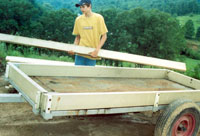Summary Statement
Do’s and don’t’s about involving youth under 18 in construction, including applicable laws, prohibited jobs, and tragedies.
Dec 2003
The Concern
Youth who are under 18 years old can be an asset to your workforce. They are enthusiastic and eager to learn. However, like other new and inexperienced workers, these young workers can be injured on the job when they don't receive adequate safety training and supervision. Some injuries have a lifelong impact, and some are even fatal. Furthermore, on-the-job injuries to young workers can be costly.
Young workers get hurt when:
- They take on jobs for which they're not trained — sometimes without being asked
- They don't have appropriate supervision
- They work with dangerous tools or equipment
- They perform tasks that violate youth employment laws
Work on a construction site is especially hazardous. In fact, the construction industry, which employs less than 3% of all young workers, ranks 3rd in the number of work-related fatalities to youth — at 14% of all occupational deaths to youth under 18.
Could a tragedy like this happen at one of your work sites?
In 2000, a 16-year-old male framing construction crew member died after falling 27 feet from the third story of a residential dormitory construction site. The boy was standing on an 8-inch wide structural wooden beam while positioning roof trusses. Fall protection equipment was not being used. His head was struck by one of the 8-foot by 4-foot trusses that fell with him to the ground. He died from severe chest and head trauma.
Recommendations Do |
Do Not |
|
|
|
|
|
|
|
|
|
|
|
|
|
|
|
|
More Tragedies
In 2001, a 14-year-old male laborer, working for a small construction company owned by his family, died when he was crushed under a 5-ton beam. At the time of the incident, the boy and two co-workers were using an airbag to lift the 79-foot metal beam. The boy was kneeling next to the beam when it rolled off the airbag, fell on top of his back, and pinned him against the ground. He was transported to a nearby hospital where he was pronounced dead.

In 1998, a 15-year-old roofer helper died after falling 16½ feet from a roof to the concrete below. At the time of the incident, the youth and a 16-year-old co-worker had been removing shingles from the roof of a house. While working to remove old shingles, the youth either struck a bundle of new shingles with his body or with the handle of a shovel. The bundle began to slide toward the back edge of the roof. In attempting to retrieve the bundle, the youth lost his balance and fell off the back edge of the roof, landing on his back and striking his head on the concrete. The boy died the following day of a closed head injury.
Laws to KnowFair Labor Standards Act (FLSA)
The federal FLSA establishes minimum wage, overtime pay, record keeping, and child labor standards affecting certain full-time and part-time workers in the private sector and in federal, state, and local governments.
Age and Hour Restrictions under FLSA
Youth under 16 years of age may only perform office or sales work in the construction industry. The federal rules also limit the number of hours and times of day that such youth may be employed.
Youth age 16 and 17 may work in the construction industry and on construction sites, but there are several tasks or jobs that are too hazardous for them to perform. There are no federal laws that restrict the number of work hours per day or per week. However, several states do restrict the number of hours and times of day that this age group may be employed. Be sure to check with your State Department of Labor.

Within FLSA, seventeen jobs are declared hazardous and are prohibited for youth under 18. Below is a partial list that may be particularly relevant for construction industry employers.
- Driving a motor vehicle
- Operating power-driven woodworking machines (including drills and nail guns)
- Operating forklifts, cranes, hoists or elevators
- Operating power-driven metal forming, punching, and shearing machine
- Operating power-driven circular saws, band saws, and guillotine shears
- Wrecking, demolition, and shipbreaking operations
- Roofing operations
- Excavation operations
If certain conditions are met, 16- and 17-year-old apprentices and student learners may be allowed to perform some of the above prohibited jobs. Youth enrolled in such programs are trained in occupational safety and health. You may wish to consider recruiting these young workers — you’ll be providing them with work experience and may be rewarded with a safety-conscious employee.
Some other young workers are not fully covered by FLSA. For example, youth of any age are generally allowed to work for businesses entirely owned by their parents, except no one under 18 may be employed in the prohibited jobs that are partially listed above.
Even if FLSA doesn’t apply, if you employ workers under 18 years old, be sure that:
- Tasks are appropriate for a worker’s age
- Young workers are properly trained
- Young workers are supervised
- You know what tasks are prohibited for youth
OSHA Regulations
Remember, OSHA laws are designed to protect all employees, including young workers, from injury.
State Child Labor Laws
Although some states solely rely on the federal FLSA laws, most states have their own laws. For instance, states may have different minimum ages for employment, different hours of work restrictions, additional occupations identified as hazardous, and work permit requirements. If the employment falls under federal FLSA jurisdiction, then both federal and state laws apply — and the most restrictive law (whether it is the state or the federal) is followed.
Finally, even if all laws are followed, incidents can and do happen — being aware of thehazards and applying safety precautions may prevent a tragedy on your work site.
Information about federal child labor laws, apprentice and student learner programs, and links to state child labor laws may be obtained from the federal Department of Labor (DOL) website at http://www.youthrules.dol.gov (click on the employers link) or from DOL’s Wage and Hour Division toll-free help line at 1-866-4US-WAGE (1-866-487-9243). TTY callers may call toll-free 1-877-889-5627.
For state-specific youth employment information, contact your State Department of Labor.


